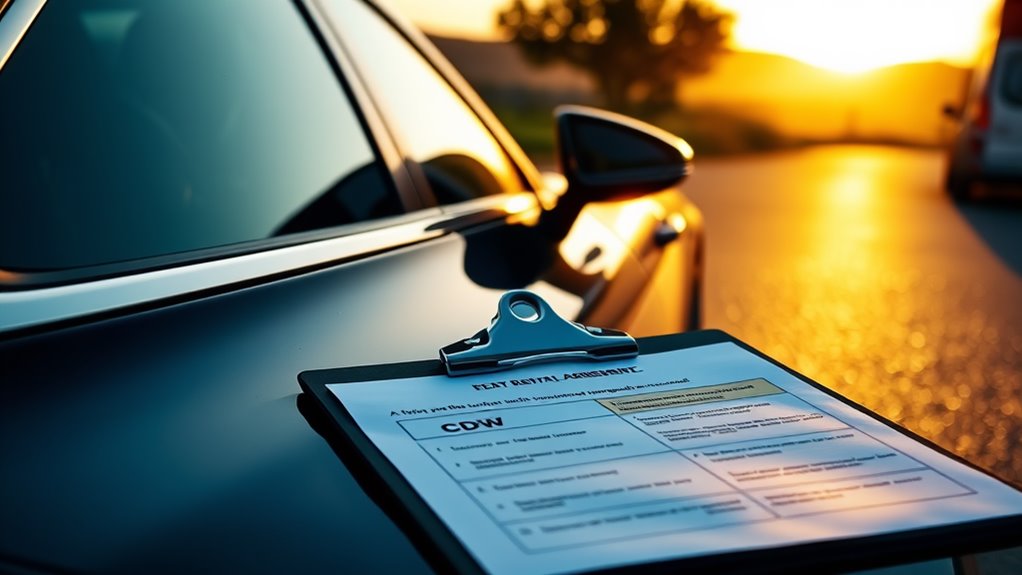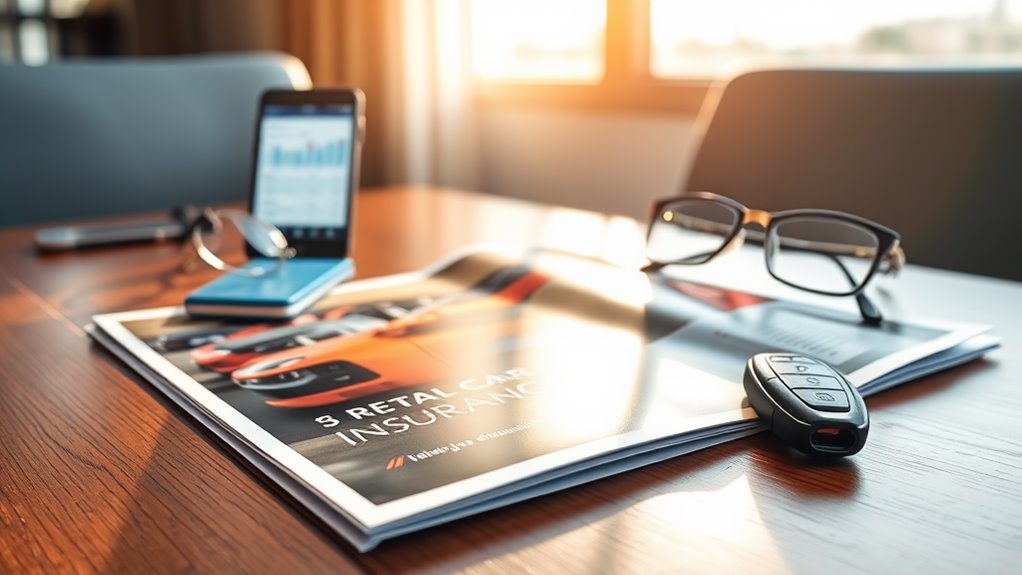When you rent a car and opt for the Collision Damage Waiver (CDW), you might think you're fully covered, but that's not always the case. Understanding the nuances between CDW and Loss Damage Waiver (LDW) is essential, as LDW includes theft protection. In addition, evaluating your liability coverage and personal accident options can affect your overall safety and financial responsibility. So, what should you really know before signing that rental agreement?
Key Takeaways
- Understand the distinction between CDW and LDW; CDW covers accident damage while LDW includes theft protection.
- Always check if third-party liability insurance is mandatory in your rental area for legal compliance and peace of mind.
- Review Personal Accident Insurance (PAI) benefits, especially if you lack health coverage or are traveling internationally.
- Compare costs and coverage between rental company insurance and third-party options; third-party often provides more customizable and economical solutions.
- Be aware of credit card insurance benefits; they may offer secondary coverage with limits, and luxury cards might provide primary coverage.
Understanding Collision Damage Waiver (CDW) vs. Loss Damage Waiver (LDW)

When renting a car, understanding the differences between Collision Damage Waiver (CDW) and Loss Damage Waiver (LDW) is essential for making an informed decision about your coverage.
CDW covers damage from accidents, while LDW includes theft in addition to accident-related damages. Both waivers typically involve deductibles, which can vary by rental location and vehicle type. It's significant to recognize that certain damages, like windshield or tire repairs, often aren't covered under CDW. While you might pay daily fees ranging from $10 to $30 for these waivers, LDW generally provides broader protection. Additionally, it's important to check whether your existing car insurance covers rental cars, as this can influence your decision to purchase CDW or LDW. Having affordable auto insurance can also help you save money on rental coverage.
Evaluating your existing coverage options, like credit card benefits or personal insurance, can help you assess whether purchasing CDW or LDW is necessary for your rental experience.
Exploring Third-Party Liability and Its Importance
Although understanding third-party liability insurance may seem intimidating, it's important for anyone renting a vehicle. This type of insurance covers damages to other drivers and their vehicles, as well as medical expenses for injuries sustained by third parties.
It's essential because:
- It offers financial protection against potential liabilities in case of accidents.
- Many regions mandate this coverage, making it crucial for compliance.
- It guarantees peace of mind while driving in unfamiliar areas.
Be aware that third-party liability insurance won't cover damages to your rental vehicle or injuries to you and your passengers.
Understanding local laws and coverage limits is important, as these can vary widely across different regions and rental companies. Always read the fine print for clarity.
The Role of Personal Accident Insurance (PAI) in Rentals
Personal Accident Insurance (PAI) plays an essential role in enhancing safety and financial security for renters, especially in the event of an accident. This optional coverage typically lasts for the duration of your rental agreement, offering benefits like medical expenses and compensation for accidental death or dismemberment for you and your passengers.
If you lack extensive health insurance or are traveling with multiple passengers, PAI becomes particularly valuable. Its importance escalates for international travelers who may not have equivalent coverage from their home country.
Additionally, given the higher accident rates associated with rental cars, investing in PAI can provide peace of mind, ensuring that you're financially protected during your travels.
Comparing Coverage Options: Rental Company vs. Third-Party Insurance

Choosing between rental company insurance and third-party insurance can greatly impact your overall travel experience and expenses.
Rental company insurance typically adds about $19 per day, offering limited coverage like basic collision damage waivers but often lacking extensive liability coverage.
In contrast, third-party insurance generally provides more cost-effective options with customizable coverage, including liability, thorough protection, and personal effects coverage.
- Third-party options usually cost less and offer broader coverage.
- They can be tailored to meet your specific needs.
- Rental company policies often come with hidden costs and limited flexibility.
Assessing Credit Card Rental Insurance Benefits and Limitations
How well do you understand the benefits and limitations of credit card rental insurance?
Typically, this insurance offers secondary coverage, meaning you'll need to file claims with your personal insurance first. Coverage limits generally range from $25,000 to $50,000, while luxury credit cards may provide primary coverage without involving personal policies.
It usually covers vehicle damage from accidents, theft, and certain costs like loss-of-use charges, but it excludes personal injuries and mechanical breakdowns. Additionally, coverage often applies only to specific vehicle types, excluding exotic cars.
Duration limits are usually 15 days domestically and 31 days internationally. Always check your card's specific terms, especially for international rentals, as exclusions may vary considerably.
Conclusion
Maneuvering car rental insurance can feel like wandering through a maze, but understanding your options empowers you to make informed choices. By distinguishing between CDW and LDW, ensuring third-party liability coverage, and considering PAI, you can shield yourself from unexpected expenses. Don't forget to compare rental company offers with third-party options and explore your credit card benefits. With this knowledge in hand, you're not just renting a car—you're driving with confidence and peace of mind.

